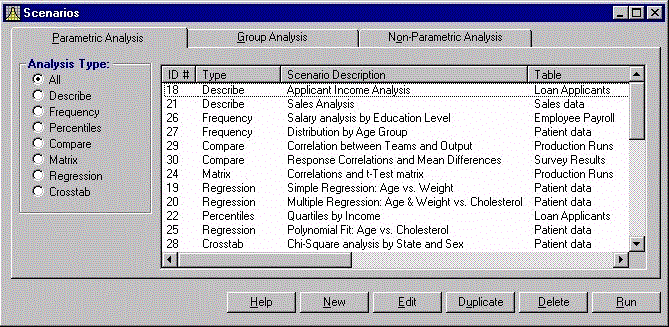Independent Review
Performing Statistical Analysis
Visual Basic Programmer's Journal
May 1999 edition
by Rama Ramachandran
If you're writing Visual Basic programs that perform
statistical calculations, don't try to export your data into a third-party
statistical package and then re-import it.
Total VB Statistics from FMS lets you link to a statistical engine
directly from within your VB code. VB has only a few statistical functions,
restricted to functions within SQL statements. Sophisticated calculation
including regressions, correlations, t-tests, confidence intervals, and
group analysis aren't possible. With Total VB Statistics, you can pass
entire recordsets and retrieve customized results to and from its
statistical engine. The product, which offers separate versions for VB5 and
VB6, comes as an ActiveX DLL you can distribute with your application.
Just instantiate an object based on the DLL's class, set some properties,
and invoke the method to perform the calculation. Total VB Statistics
integrates neatly into your VB project, and can analyze any Microsoft/Jet
Access table or query. The results of the analysis are placed in an
Access table you can manipulate later.
Total VB Statistics ships with the
Scenario Designer, a wizard-like application you use to set up the
process of your statistical analysis. Each analysis can be stored and
retrieved as a "scenario" for reuse. You can test each scenario against the
data in your tables in design mode and tweak the scenario as needed.
To analyze different types of data based on continuity, you can perform more
than 17 [categories of] statistical calculations that fall into three
categories: parametric analysis, group analysis, and nonparametric analysis.
After determining your analysis design in the Scenario
Designer, choose a menu option to generate VB code. This code includes all
the calls to instantiate an object, set its properties, and invoke the
method to perform the statistical analysis. Simply copy and paste the
code into your project.
The Scenario Designer presents you with numerous parameters
you need to set; you need a background in statistics or knowledge about the
particular function. Also, Total VB Statistics relies on the
Microsoft/Jet Access tables to hold all the scenario information and return
the results. A VB program that uses ADO to go directly to SQL Server, for
example, must include an Access database and all its support files to make
use of the Total VB Statistics functionality. It would be better if
the statistics engine could simply accept a recordset variable for input and
return the output as another recordset variable. Another enhancement could
be to use a variant array for input/output.*
If you are looking for a small but powerful statistical
calculation engine, Total VB Statistics can help. It is flexible and easy to
use, and best of all, it writes the code for you.
Rama Ramachandran is Director of Technology with Imperium
Solutions, a Microsoft Solution Provider Partner. He designs and develops
desktop and online client/server database systems using Visual Basic, Visual
InterDev, ASP, Access, and FoxPro. He lives in Stamford, Conn., with his
wife Beena and their son Ashish. Reach him at
rama@imperium.com.
*FMS Comments: our design to use Jet tables insures that
output tables can be created (such rights cannot be guaranteed against other
databases in all cases) and the availability of a workspace for temporary
files which are needed for some calculations. There is little or no
performance implication because data is retrieved only once. We welcome
comments regarding this feature:
suggestions@fmsinc.com.

Add Statistical Number Crunching. When you click on
the Run button in the Scenario Designer, it executes the
calculations and presents the results in a table. It
even generates the source code to perform this action from
within your VB program.
Back to Main Reviews Page









